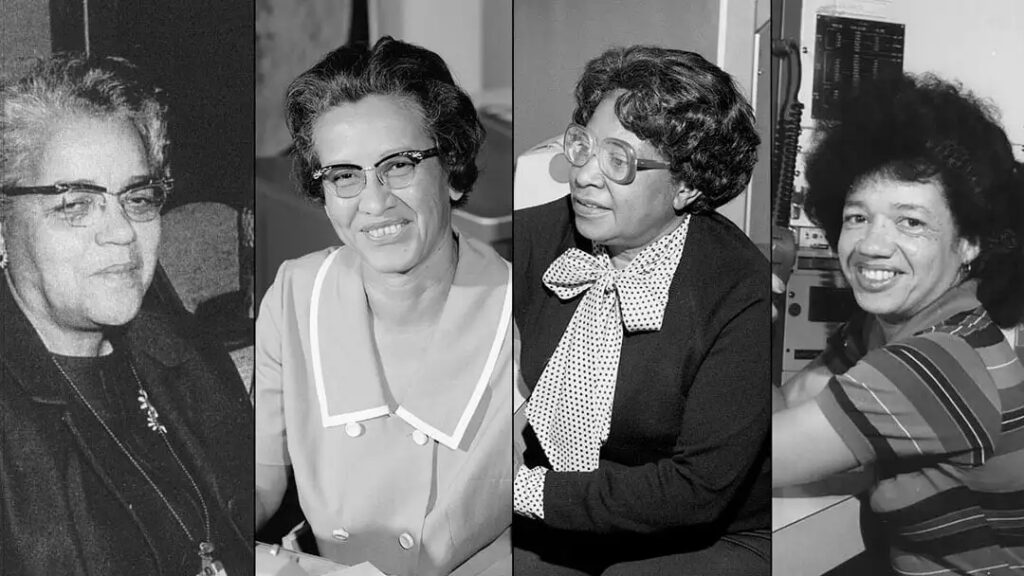Last updated on January 29, 2024
On November 8, 2019, the Hidden Figures Congressional Gold Medal Act was signed into public law. The legislation honors Katherine Johnson, Dorothy Vaughan, Mary Jackson, Dr. Christine Darden, and all the women whose outsized contributions during the Space Race era at NASA (or for some at the time, NACA) went unrecognized for decades.

Image Source: BlackVoiceNews
A Bipartisan Triumph: The Journey of the Hidden Figures Act
The legislation was introduced and supported in a bipartisan manner by the chairwoman of the House Science Committee, Rep. Eddie Bernice Johnson (D-TX), and the ranking member Rep. Frank Lucas (R-OK). The Senate companion bill was introduced by Sens. Chris Coons (D-DE) and Kamala Harris (D-CA).
Rep. Johnson introduced the legislation in the prior session of Congress, where it failed to gain much traction due to a lack of Republican support while they were in the majority. However, during the 116th Congress, with the departure of Rep. Lamar Smith (R-TX) as Chair, the House Science Committee produced several bipartisan bills.
Breaking Barriers: Rep. Eddie Bernice Johnson’s Historic Role in the House Science Committee
Former Rep. Johnson’s chairwomanship of the House Science Committee was historic in its own right — she was the first woman and first African American to serve as chair of the committee. In 1993, she was the first registered nurse elected to Congress and throughout her career her work prioritized equitable access to STEM education. After Johnson’s passing in December, 2023, she became the namesake for the National Science Foundation’s Eddie Bernice Johnson INCLUDES Initiative, in recognition of her work encouraging diversity in the STEM workforce.
Beyond the Movie Screen: Real-Life Impact of ‘Hidden Figures’
The legislation bears the same name as the 2017 movie, “Hidden Figures,” based on the true story told in the book by Margot Lee Shetterly. The four women named in the legislation made critical contributions to the field of aeronautics and mathematics and were known as “human computers,” who completed (by hand) the complex calculations critical to the Voyager and Apollo missions, among others.
AnitaB.org celebrates the immeasurable ripple effect of each Black women in aerospace, and other areas of STEM. Mary Jackson, honored in this legislation, was the first Black woman engineer at NASA, eventually becoming the most senior engineer, while continuously advocating for children’s opportunities in science. We had the joy of joining Janelle Monae, who played Mary Jackson, on the B The Way Forward podcast, to discuss the impact and importance of sharing these stories. We also had the honor of welcoming Aisha Bowe, NASA rocket scientist turned entrepreneur, as a keynote at GHC 23, and we look forward to a tech industry with more individuals reaching for the stars as aerospace engineers, scientists, and more.

Aisha Bowe on stage at Grace Hopper Celebration 2023
Addressing the Legacy of Inequality: The Continued Fight for Gender and Pay Equity in STEM
The Congressional Gold Medal is Congress’ highest expression of national appreciation for distinguished achievements and contributions by individuals or institutions. Vaughan and Jackson, who both passed away before the legislation was passed, were awarded the honor posthumously.
For decades the achievements of women, and in particular Black women, have gone underappreciated and uncelebrated, with unequal wages, harassment, and segregation accepted as the norm. Today, though we can recognize some improvement, the erasure of women’s contributions to science, technology, and innovation continues. Thus, AnitaB.org continues to fight for gender and pay equity throughout the tech industry. This award not only honors these women’s invaluable contributions to science but also helps acknowledge the discrimination they endured while changing history.
Taking Action: How to Support Women in STEM Through Legislative Advocacy
Supporting women in STEM through legislative advocacy is a vital step toward fostering a more inclusive and equitable tech industry and global future. If this is something you’re passionate about, stay informed about relevant legislation and policy initiatives that promote gender equality and diversity in STEM fields. Contact your local representatives to express your support for these initiatives and encourage them to take action. Additionally, participating in local STEM education programs and supporting organizations that focus on historically excluded groups in science and tech can help amplify their voices. By combining these efforts, we can create a more supportive environment for women in STEM, ensuring their contributions are recognized and their potential fully realized.
Read more posts from the thread Hidden Gems: Non-traditional Tech Careers You Might Not Know About

